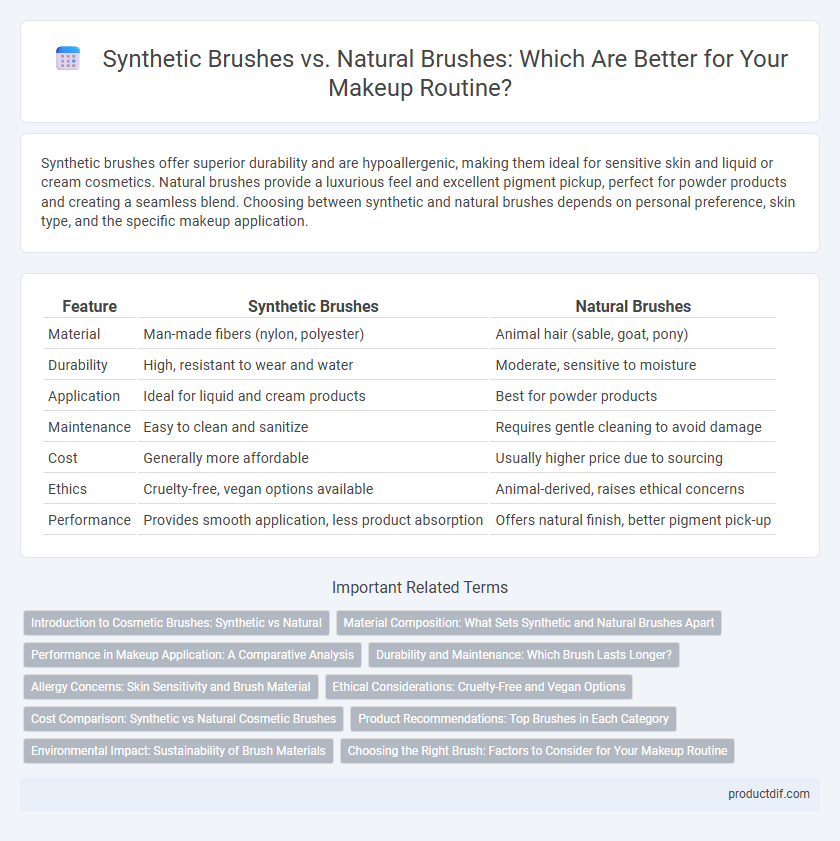Synthetic brushes offer superior durability and are hypoallergenic, making them ideal for sensitive skin and liquid or cream cosmetics. Natural brushes provide a luxurious feel and excellent pigment pickup, perfect for powder products and creating a seamless blend. Choosing between synthetic and natural brushes depends on personal preference, skin type, and the specific makeup application.
Table of Comparison
| Feature | Synthetic Brushes | Natural Brushes |
|---|---|---|
| Material | Man-made fibers (nylon, polyester) | Animal hair (sable, goat, pony) |
| Durability | High, resistant to wear and water | Moderate, sensitive to moisture |
| Application | Ideal for liquid and cream products | Best for powder products |
| Maintenance | Easy to clean and sanitize | Requires gentle cleaning to avoid damage |
| Cost | Generally more affordable | Usually higher price due to sourcing |
| Ethics | Cruelty-free, vegan options available | Animal-derived, raises ethical concerns |
| Performance | Provides smooth application, less product absorption | Offers natural finish, better pigment pick-up |
Introduction to Cosmetic Brushes: Synthetic vs Natural
Cosmetic brushes are essential tools for makeup application, with synthetic and natural bristles offering distinct benefits. Synthetic brushes, made from man-made fibers like nylon or polyester, excel in applying liquid and cream products due to their non-porous nature and durability. Natural brushes, crafted from animal hair such as sable or goat, provide superior pick-up and blendability for powder products, favored for their softness and precision.
Material Composition: What Sets Synthetic and Natural Brushes Apart
Synthetic brushes feature fibers made from nylon, taklon, or polyester, offering durability, ease of cleaning, and hypoallergenic properties ideal for sensitive skin. Natural brushes are crafted from animal hairs like sable, goat, or pony, valued for their softness and ability to pick up and distribute powder products evenly. The primary distinction lies in the material composition, influencing performance, maintenance, and ethical considerations in cosmetic application.
Performance in Makeup Application: A Comparative Analysis
Synthetic brushes offer superior performance in makeup application by providing a smooth, even distribution of liquid and cream products without absorbing excess product, ensuring minimal waste. Natural brushes excel in blending powder products due to their porous, flexible bristles that pick up and diffuse powder more effectively for a softer finish. Choosing between synthetic and natural brushes depends on the makeup type, with synthetic favored for precision and durability, while natural brushes deliver optimal results with powder formulations.
Durability and Maintenance: Which Brush Lasts Longer?
Synthetic brushes offer superior durability compared to natural brushes due to their resistance to wear and less susceptibility to damage from moisture and bacteria. Natural brushes, made from animal hair, require delicate maintenance such as gentle cleaning and proper drying to prevent shedding and deformation. Choosing synthetic brushes reduces the frequency of replacements, as they maintain shape and performance longer under regular use and washing.
Allergy Concerns: Skin Sensitivity and Brush Material
Synthetic brushes are hypoallergenic and less likely to cause skin irritation, making them ideal for sensitive or allergy-prone skin compared to natural brushes, which may harbor allergens from animal hair. Natural brushes, made from animal fibers, can exacerbate allergic reactions or sensitivities due to protein residues and environmental contaminants. Choosing synthetic brushes reduces the risk of dermatitis, ensuring a safer application for those concerned with skin allergies and sensitivities.
Ethical Considerations: Cruelty-Free and Vegan Options
Synthetic brushes provide a cruelty-free and vegan alternative to natural brushes, eliminating animal harm and reducing ethical concerns. Many cosmetic brands prioritize synthetic bristles crafted from high-quality nylon or taklon, ensuring superior performance without compromising animal welfare. Choosing synthetic brushes supports sustainable beauty practices aligned with cruelty-free certifications and vegan product standards.
Cost Comparison: Synthetic vs Natural Cosmetic Brushes
Synthetic cosmetic brushes generally cost less than natural brushes due to lower material and manufacturing expenses. Natural brushes, often made from animal hair like sable or goat, usually have higher prices because of sourcing and ethical considerations. Consumers seeking budget-friendly options tend to prefer synthetic brushes, which offer durability and affordability without compromising performance.
Product Recommendations: Top Brushes in Each Category
For synthetic brushes, the Sigma Beauty Classic Brush Set and Real Techniques Everyday Essentials offer superior performance with cruelty-free, durable bristles ideal for liquid and cream products. In the natural brush category, the Morphe X Jaclyn Hill Collection and MAC 217 Blending Brush provide exceptional softness and precision, perfect for powder application and blending. Choosing the right brush depends on product type and skin sensitivity, with synthetic options excelling in versatility and natural brushes preferred for a flawless finish.
Environmental Impact: Sustainability of Brush Materials
Synthetic brushes, often made from nylon or polyester, offer a more sustainable alternative due to their cruelty-free production and durability, reducing the need for frequent replacement. Natural brushes, crafted from animal hair, raise ethical and environmental concerns related to animal welfare and resource-intensive farming practices. Choosing synthetic options helps minimize deforestation and biodiversity loss, supporting eco-friendly beauty routines.
Choosing the Right Brush: Factors to Consider for Your Makeup Routine
Choosing the right makeup brush involves evaluating factors such as skin sensitivity, application precision, and budget, with synthetic brushes excelling in blending liquid and cream products while offering hypoallergenic benefits. Natural brushes provide superior pickup and distribution of powder products due to their porous textures but may require more maintenance and could cause allergies for sensitive skin. Consider your typical makeup products, skincare needs, and cleaning preferences to determine whether synthetic or natural bristles best complement your routine.
Synthetic Brushes vs Natural Brushes Infographic

 productdif.com
productdif.com